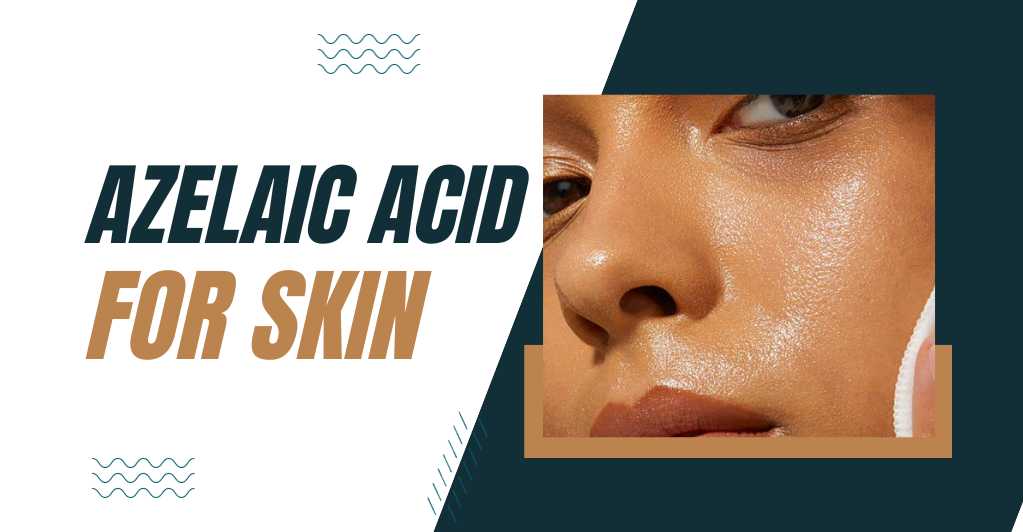
Azelaic Acid for Skin
In recent years, chemical acids have made a huge surge in the skincare industry. Skincare enthusiasts are getting out of the idea that all-natural products are good and chemical ones are bad for our skin.
Dermatologists often prescribe different acids of a certain percentage for skin care treatments. If you maintain the consistency, these acids can do wonders for your skin. Azelaic acid is one such product that is gaining popularity for its gentle yet powerful component to transform skin.
Let’s learn how you can use azelaic acid for skin, what are the benefits, Is azelaic acid safe to use and what are other skin ingredients you shouldn’t use along with azelaic acid.
Benefits of Azelaic Acid for Skin
1. Anti-inflammatory Properties: Anti-inflammatory properties of Azelaic acid benefit people with sensitive or reactive skin. If you have various skin conditions including redness and inflammation, azelaic acid is the perfect skin ingredient for you.
2. Gentle Exfoliator: Azelaic acid is mainly available in grains. (Wheat / Barley) etc. But for uses in skincare, it is formulated chemically. Azelaic acid is very gentle on your skin and is an amazing chemical exfoliator to remove dead cells. It unclogs your pores and helps reduce fine lines and acne scars.
3. Effective Against Acne: One of the most amazing benefits of azelaic acid is its effectiveness in treating acne. It kills the bacteria that causes acne and prevent the future breakouts. For those struggling with acne-prone skin, azelaic acid can be the game-changer product for you.
4. Rosacea Treatment: Dermatologists often prescribe Azelaic acid for its anti-inflammatory properties. It is proven to treat redness and inflammation. Azelaic acid soothes irritated skin.
5. Reduces Hyperpigmentation: Most people in tropical countries have to deal with uneven skin tone and dark spots. Azelaic acid
can be your saviour. It reduces the production of excess melanin (pigment responsible for dark spots and uneven skin tone). If you use azelaic acid consistently, you will notice an even radiant skin tone within the next few months.
6. Mild on Skin: Azelaic acid is gentle and generally it suits almost all different skin types. Its mild nature makes it a desired product for people who have sensitive skin. Without causing any irritation, Azelaic acid will treat your skin.
How Can I Use Azelaic Acid For Skin To Get The Best Results?

If Azelaic acid has been prescribed to you by any dermatologist, use it as instructed. But if you want to use it by yourself, you can go through the points described below to get the best results.
Patch Test First: A patch test is needed before using any product to be on the safe side. Before using Azelaic acid, apply it on your hand. Wait for a few hours to make sure your body isn’t showing any adverse reactions like redness or itching.
Start Slowly: If everything is good then you can add Azelaic acid to your skincare regime. But start with twice or thrice per week. Let your skin get used to the new ingredient without overwhelming it. You can gradually increase the frequency to alternate days after using it for a while.
Apply as Directed: You can apply Azelaic acid anytime a day. In the morning or at night but using it at night is preferably better. On the clean dry skin apply the Azelaic acid and massage gently till it gets absorbed by your skin. Wait for 3-5 minutes and apply moisturizer afterward if using it at night time. Using it at night time is more suitable.
Use Sunscreen: If you are using azelaic acid, you should make sure to apply a broad-spectrum SPF sunscreen (SPF 30+) in the daytime. Azelaic acid makes our skin sensitive and poor usage of sunscreen can damage your skin making it worse. In the daytime follow this routine, Use azelaic acid> Moisturizer> sunscreen.
Be Consistent: Skincare is a long time process. To get the optimal results, be consistent. Add Azelaic acid into your skincare routine, be patient, and use the product and sunscreen as instructed. Within 1/2 months you will start noticing the difference.
Does Azelaic Acid Have Any Side Effects?
Azelaic Acid is generally safe to use but if you face any rare allergic reaction, skin sensitivity, and itching or burning, you should stop using the product.
Minimal Side Effects
azelaic acid is generally well-tolerated, but like any skincare ingredient, it may have some side effects. The most common side effects include a burning sensation or itching upon application.
Rare Allergic Reactions
While uncommon, it’s not impossible for some people to get an allergic reaction after using Azelaic acid. If you experience redness or swelling, immediately discontinue using the product and go to a skin specialist.
Sun Sensitivity
As mentioned earlier, azelaic acid may increase sun sensitivity. It’s very important to use sunscreen (SPF 30+) during the day to save your skin from harmful ultraviolet rays. Otherwise, your skin will be severely damaged and the condition will be worse.
You Should Not Be Using Azelaic Acid If You Have Any Of The Conditions Mentioned Below
1. Azelaic acid should not be applied on broken, wounded, or cut skin.
2. Azelaic acid should be discontinued in case of stinging, burning, or itching sensation.
3. Azelaic acid should not be used if you are already using other skin care products prescribed by dermatologists.
4. Azelaic acid should be avoided if you have highly sensitive skin.
5. Pregnant or the women who are currently breastfeeding, should avoid using Azelaic acid.
6. If you have skin conditions like dyshidrotic eczema or psoriasis you should consult a dermatologist before using Azelaic acid.
7. Avoid using any physical scrub while using Azelaic acid. Physical scrub can be harsh on your skin and unnecessary as Azelaic acid is a gentle chemical exfoliator.
8. Young children should not be using skin-active ingredients like Azelaic acid as it can make their skin more sensitive.
Skin Ingredients You Should Avoid While Using Azelaic Acid

Here are some products and ingredients you should generally avoid using along with azelaic acid.
Other Active Acids: Avoid using azelaic acid with other active acids like AHA, BHAs, salicylic acid or lactic acid. Using different skin active ingredients together can cause irritation making skin more delicate.
Retinoids: Combining azelaic acid with retinoids (such as retinol, tretinoin, or adapalene) can increase skin sensitivity and irritation. If you wish to use both, it’s best to use them at different times, such as azelaic acid in the morning and retinoids at night, but make sure to consult a dermatologist first.
Benzoyl Peroxide: Azelaic acid and benzoyl peroxide are both effective for acne, but using them together can cause excessive dryness, redness, and irritation. If your dermatologist recommends using both, then use as prescribed.
Vitamin C: While some people use azelaic acid with vitamin C products together, it’s better not to combine this too. It can dry out causing skin irritation.
Also Read: 7 Ancient Mantras That Will Transform Your Life
Frequently Asked Questions About Azelaic Acid For Skin Care
Q1. What are the benefits of Azelaic Acid for skin?
Ans. Azelaic acid helps to reduce acne and hyperpigmentation. It’s a gentle exfoliator and is sometimes prescribed to treat rosacea.
Q2. Can I use Vitamin C and Azelaic acid together?
Ans. Vitamin C and Azelaic acid should not be used together as it can dry out and irritate your skin. This can be an overwhelming combination for your skin. But if you want to use both of the products, use one in the morning and one at night.
Q3. Is Azelaic acid safe to use during pregnancy?
Ans. During pregnancy, Azelaic acid should be avoided. If you want to use it, ask a skin specialist first.
Conclusion
Azelaic acid is a great skin active ingredient if one uses it for targeted skin problems. Its gentle exfoliation, acne-fighting properties, ability to reduce hyperpigmentation, and gentle effect on sensitive skin make it a must-add to your beauty routine.
By following the recommended usage guidelines and considering the potential side effects, you can make Azelaic acid a part of your skincare regime. Be consistent and let Azelaic acid give you healthy, radiant skin.






